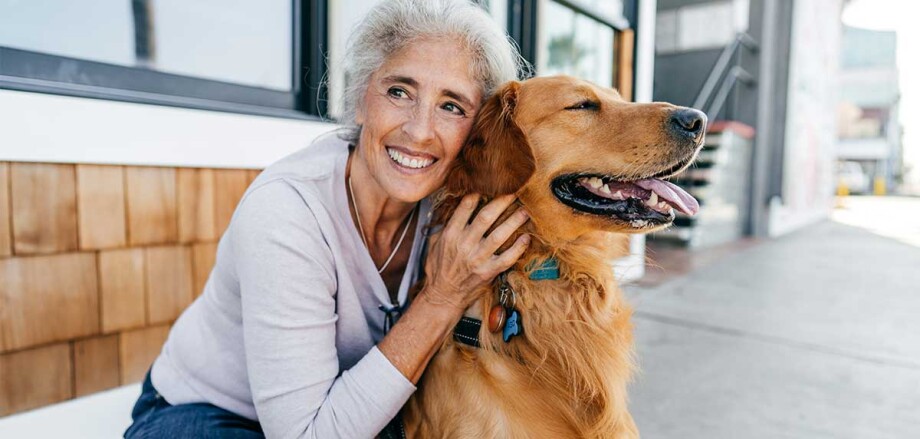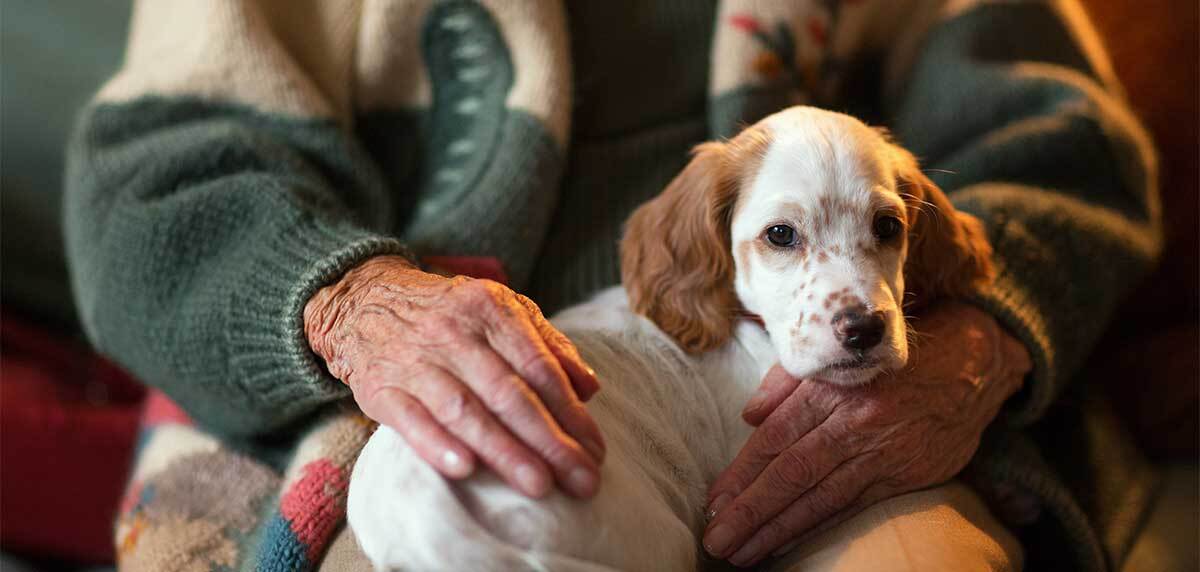The age of a dog in human age – A history of calculation
01.01.2024 - Reading time: 5 minutes

A dog grows up much faster than a human. Here you can find out how old your dog is in human years.
The adorable puppy that you welcomed into your family a few years ago has grown up and you may be questioning how old your dog is in human years. Unfortunately, dogs live much faster than their owners so a table showing dog ages converted to human ages will give you an idea of the “real” age of your four-legged friend.
- At what age does a puppy become an adult?
- The age of dogs in human years according to their size
- Age of a small dog in human years
- Age of a medium-sized dog in human years
- Age of a large dog in human years
- Another method to calculate the age of your dog in human years
- At what age does a dog become a senior?
- What is the life expectancy of my dog?
At what age does a puppy become an adult?
Before we address the topic of a dog’s age in human years and how to calculate it, let’s take a look at the evolution of a puppy. It says a lot about the speed at which a dog ages. The maturity of man’s best friend depends on its size and breed. The bigger the dog is as an adult, the less quickly it grows. Small dogs mature sooner.
Here is the age at which dogs become adults based on their size:
- Small dogs under 15 kg: between 9 and 12 months
- Medium-sized dogs from 15 to 40 kg: between 10 and 18 months
- Large dogs over 40 kg: between 18 months and 2 years
- Very large dogs: between 2 and 3 years
Adulthood thus corresponds to the age at which a dog has fully grown. Sexual maturity occurs before this age. If you know the approximate age at which your dog is classed as an adult, you will have a better understanding of its behavioural changes. Be patient with your dog during its teenage years: just like for humans, this part of life is often somewhat hectic. Adapt your dog’s diet to its new needs by giving it adult dog food. Do not hesitate to ask your vet for advice if you are not sure when the right time to change from puppy food to adult food is.
The age of dogs in human years according to their size
You may have heard that you need to multiply the age of your dog by seven to find out its age in human years. Calculating its age this way does not take into account how quickly a dog develops depending on its size. That is why we provide you with a more precise method that informs you about the age of your dog in human terms:
Age of a small dog in human years
Small dogs weighing up to 15 kg include the following breeds: Maltese, Chihuahua, Yorkshire, Pug, Cairn Terrier, Cavalier King Charles, Jack Russell Terrier, etc.
Actual age of the dog | Equivalent in human years |
|---|---|
1 year old dog | 20 years |
2 year old dog | 28 years |
3 year old dog | 32 years |
4 year old dog | 36 years |
5 year old dog | 40 years |
6 year old dog | 44 years |
7 year old dog | 48 years |
8 year old dog | 52 years |
9 year old dog | 56 years |
10 year old dog | 60 years |
11 year old dog | 64 years |
12 year old dog | 68 years |
13 year old dog | 72 years |
14 year old dog | 76 years |
15 year old dog | 80 years |
16 year old dog | 84 years |
17 year old dog | 88 years |
18 year old dog | 94 years |
19 year old dog | 100 years |
20 year old dog | 110 years |
Âge du chien moyen en âge humain
Medium-sized dogs weighing between 15 and 40 kg include the following breeds: Labrador Retriever, Australian Shepherd, Siberian Husky, Continental Bulldog, Boxer, Collie, etc.
Actual age of the dog | Equivalent in human years |
|---|---|
1 year old dog | 18 years |
2 year old dog | 27 years |
3 year old dog | 33 years |
4 year old dog | 39 years |
5 year old dog | 45 years |
6 year old dog | 51 years |
7 year old dog | 57 years |
8 year old dog | 63 years |
9 year old dog | 69 years |
10 year old dog | 75 years |
11 year old dog | 80 years |
12 year old dog | 85 years |
13 year old dog | 90 years |
14 year old dog | 96 years |
15 year old dog | 102 years |
16 year old dog | 110 years |
Age of a large dog in human years
Large dogs weighing over 40 kg include the following breeds: Kangal, Great Dane, Leonberger, Mastiff, St. Bernard, Newfoundland, etc.
Actual age of the dog | Equivalent in human years |
|---|---|
1 year old dog | 16 years |
2 year old dog | 22 years |
3 year old dog | 31 years |
4 year old dog | 40 years |
5 year old dog | 49 years |
6 year old dog | 58 years |
7 year old dog | 67 years |
8 year old dog | 76 years |
9 year old dog | 85 years |
10 year old dog | 96 years |
11 year old dog | 105 years |
12 year old dog | 112 years |
13 year old dog | 120 years |
The age of 2-year-old dogs, 3-year-old dogs or 10-year-old dogs in human years differs from one breed to another.

Another method to calculate the age of your dog in human years
American researchers at a Californian university have used a new method to determine the age of a dog in human years. Although the explanation for this method, which is based on DNA methylation and the epigenetic clock, is very scientific, you don’t need to be a maths whizz to use it. You can find online calculators where all you need to do is enter your dog’s age to get a number long enough to serve as a logarithm. You then need to multiply this logarithm by 16 and add 31. The result is the age of your dog in human years. As the study was carried out on Labradors, it appears to be more applicable to dogs of a similar size. However, the idea is interesting and will certainly lead to further research in this area.
At what age does a dog become a senior?
A dog’s senescence threshold also varies depending on its size. In small dogs, signs of ageing appear at around nine years old. For medium-sized dogs, the senescence threshold is reached at 8 years old. The age is 6 years old for large dogs. But don’t worry – if your dog is getting close to this age or has already past it, it doesn’t mean that they have reached the end of their life. They still have many years to spend by your side. In fact, this age is the age at which you notice certain signs of ageing in your faithful companion:
- Greying hair
- Thinner and less shiny coat
- Visual and hearing impairments
- Loss of appetite
- Lack of energy
- Breathlessness
- Longer periods of sleep
When a dog enters this stage of life, its owners must, of course, continue to look after its welfare. If your dog no longer wants to go on long walks, offer several short walks. They will be physically active, can meet dog friends and exercise their joints. Ask your vet to examine your dog once or twice a year to detect illnesses as early as possible. Your dog is less active so it is also time to change their diet and offer high-quality senior food. Make the transition gradually to avoid digestive problems such as diarrhoea.
What is the life expectancy of my dog?
The size of your dog also influences their life expectancy. On average, small dogs live longer than large dogs. As well as size, the breed of a dog can also influence its lifespan. Some breeds are more susceptible to disease than others. Finally, a dog’s lifestyle plays a role in its lifespan. Just as in humans, obesity tends to shorten the length of life. A healthy diet tailored to the dog’s age and energy requirements is therefore essential for a long life as a healthy dog. Another factor that lengthens the life expectancy of a senior is physical activity. Daily walks are good for dogs and… for their owners. Just as with humans, stress can cause physical problems and lead to a shorter life. So make sure that your dog grows up in a positive atmosphere and feels safe. You will enjoy many years of dog ownership with your faithful companion. Remember that one year for a dog is many years for a human.


